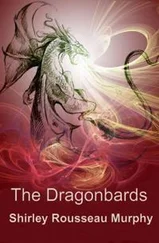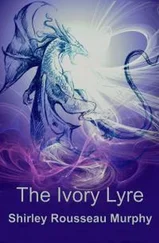She sheathed her sword and sat down astraddle the log so she could look away from the campfire, behind her. She did not give her name. That smudge of dark against the stars was tall mountains. Surely she was in the Ring of Fire.
Or on the edge of it. “The deer meat smells good,” she said quietly. “The deer are plentiful?”
He gave her a puzzled look. “Scarce as teeth in a frog. Came on this one crippled.” He paused, rummaged in his pack for a wineskin, took a swig and passed it across to her. “Things in those mountains that kill deer, lady. Wolves. Fire ogres. Chancy traveling for a lady,” he said without malice. “Chancy—if you be traveling alone. . . .”
She took a sip and handed the skin back. “I travel alone, herder.” Her heart had leaped at the mention of wolves. Could there be great wolves here? Or did he mean only the common wolves? She tried to hide her eagerness. “The wolves are killers,” she said casually. “Killers . . .”
He nodded, grunting, took another sip.
“Are they very bold? Do they raid your herds?”
“Sometimes, lady. We kill some, and they do not return for a while.”
She let out her breath, disappointed. Common wolves, then. Only common wolves raided the herds of men. The great wolves did not.
“How do you come here, lady, traveling alone?”
“It—was silent and peaceful in the deep mountains. I—I have a sorrow, I wanted to travel in solitude.” She gave him a long, deep look, eyes soulful. Her brother Jerthon would have said it made her look as if she would cry any minute. The little man nodded with quick embarrassment, obviously hoping she wouldn’t burst into tears. She studied him beneath lowered lashes, trying to remember where men had ever herded goats on the mountains. The Cherban had grazed their goats on the hills of Urobb farther south, and down in the rich marsh pastures of Sangur, where few men dwelled, but not here, not on the mountains of fire. When had they come here? Surely she was in a future time—or else in a time so ancient it had been all but forgotten when she was growing up. She stared past him trying to make out more of his herd, trying to see if there were other herders.
“The village is down along that lower ridge,” Gravan offered, pointing. The moons had begun to lift in the east, fingering their gentle light across low hills. Could those be the hills of Carriol? Her pulse quickened. Or the hills along the Urobb? Running as they did, away from the mountains, they had to be one or the other. She gazed off toward the east where Carriol must lie, with a painful sweep of homesickness, thought of the twin moons rising over Carriol.
“Do you come to Dunoon with a purpose, lady?”
Dunoon? There had been no place called Dunoon in her time. And that faint rushing noise must surely be a river. A mountain river could be any one of four, but in this location, with such rounded, low hills on its east, it was either the Owdneet or the Urobb. She watched Gravan in silence. If she could know what river, she would know where she was, even if she did not know when. “I—I must confess I was lost. I saw your fire—I guess I wanted company.” She unslung her waterskin and tipped it up to drink, then shook it, frowning. “Stale. Tastes of rock.”
“Fill it in the river, lady. You don’t seem to mind a little walk in the darkness. There,” he said, pointing. “Just where that darkest ridge rises, the Owdneet flows deep and white. Sweet, good water, lady.”
The Owdneet. She felt a thrill of excitement. To hear its name engulfed her at once in the fabric of her childhood, made her long for something she could not put to words. She rose slowly, casually, trying to hide her eagerness, slipped her waterskin over her shoulder and walked away toward the sound of the river; wanting to run, wanting to shout some crazy, wild welcome to the churning, ranting Owdneet.
As she drew close to the river, its roar nearly deafened her. Excited her. Her memory of the Owdneet was a memory of smells: wild tammi and sweetburrow and the smell of coolness on hot summer days. Now, though she had not yet reached the river, the smell of tammi came to her so strong it might have been crushed under her own feet passing along the bank of the river. To her left and below her, she could see the faint lights of Dunoon. It was only a tiny village, a few thatched roofs catching the moonlight. And steep down the mountain, a faint smear of light that must mark the city of Burgdeeth. This place called Dunoon lay just above Burgdeeth, then. Burgdeeth, where she had grown up. Where first she had met Ram, where they had been children together. There had been no village here on the mountain then, only the wild stag and hare, and the great wolves roaming silently. How many times had she and Ram slipped up across these meadows in secrecy to the caves of Owdneet, where the great wolves denned.
Were tyrants still in control of Burgdeeth? Was Venniver still Landmaster? Or was he long dead and turned to dust, and another Landmaster risen to rule? And what relationship was there between this herding village and Burgdeeth? She stood staring down the mountain at Burgdeeth, caught in emotions she thought had died long ago. And was there a reason why she had been drawn to this place where she and Ram had been children? Some meaningful linking to Ram here? She could see white water now, catching the moonlight, soon stood beside the river watching it plunge down the mountain. Twelve years since she had stood here. How many years, in Time, was it? How many generations?
She emptied her waterskin on the ground, then knelt and let it fill with the Owdneet’s foaming brew. She drank long from her cupped hands, then rose and stood lost in the roar and beauty of the river, moonlight like white fire over its rapids. Only slowly did she become aware of another’s presence, of the feeling that she was watched.
Had old Gravan followed her?
No, this was not Gravan, this presence was powerful and disturbing. She turned, drawing her sword without sound, looked back into the darkness. But something made her swing around again to stare toward the river.
She could make out nothing on the far shore but a wood, was confused, felt the presence behind her cold and waiting. She turned to face it again and sudden visions overwhelmed her, a dizzying confusion of visions plunging and assailing her sense so she could not be sure what moved before her and what moved in the places of her mind. Surely what watched her was giving her the visions, for she could feel the strong sense of another being as a part of them. And then one vision came more sharply and she saw the village of Dunoon at dawn, the straw-roofed huts catching early light, herds of goats between the houses, children playing. She saw a tall, white-haired man come from one of the huts and recognized him. Anchorstar. Anchorstar, traveler in Time. Anchorstar, the last man in her time to have seen Ram. He stood beside a brightly painted wagon with two fine horses in the shafts. Then he vanished; it was night and the village was on fire, the roofs ablaze, and dark Herebian horsemen circling the burning huts, laughing.
The vision went. The night lay clear and empty, except for the presence that surely had drawn closer. The sense of something behind her across the river was gone now; only this strong, powerful being that had given her visions remained, and that being stood solidly between her and Gravan’s fire.
Whatever it was, she could only face it, for if she circled, it would follow her, and if she ran it would be on her. She felt clearly it was agile and swift. The glow of Gravan’s fire seemed very far away. Anyhow, what could old Gravan do to protect her that she could not do herself? She began to move away from the river, seeking in the dark, searching out for something she could attack before it attacked her.
Читать дальше
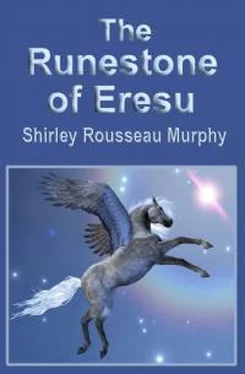
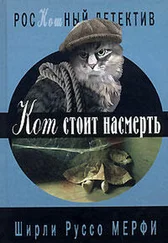
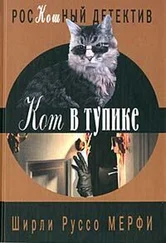
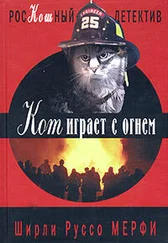
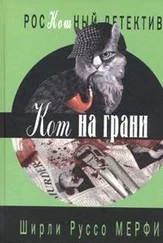

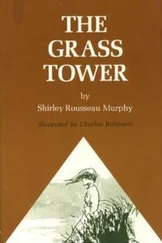
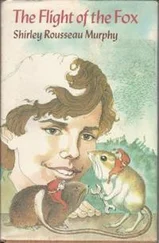
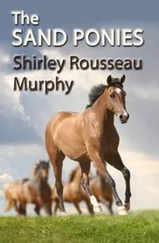
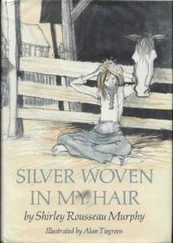
![Ширли Мерфи - The Shattered Stone [calibre]](/books/436059/shirli-merfi-the-shattered-stone-calibre-thumb.webp)
